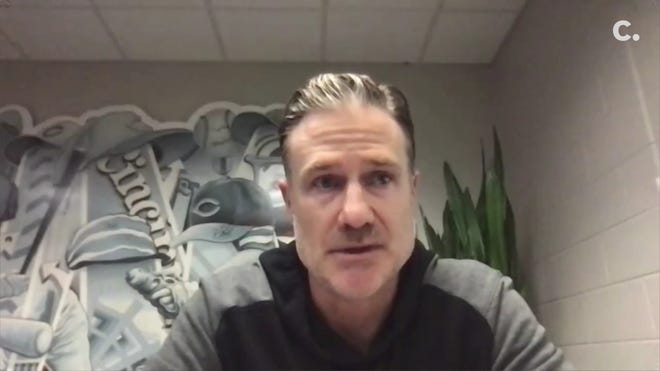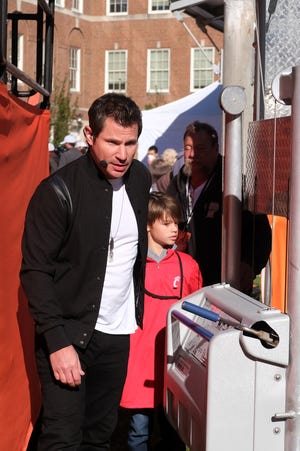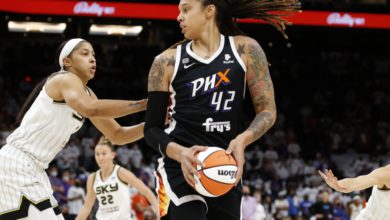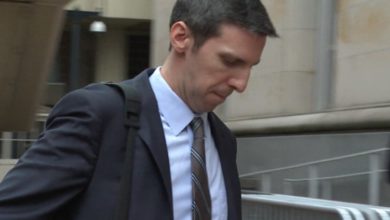
When the Cincinnati Reds held a pitching meeting on Wednesday afternoon, general manager Nick Krall addressed what will come next after a recent shakeup in the front office.
Last week, the Reds moved on from Kyle Boddy, the organization’s former Director of Pitching. After joining the Reds organization in 2019, Boddy received a new title in 2020. He brought an increasingly technological and analytical approach to the Reds' player development staff.

What comes next was the topic of conversation when Krall met with the Major League coaching staff and the player development staff on Wednesday.
“The biggest thing was, first and foremost, we recognized the fact that Kyle did a lot of good things for us,” Reds pitching coach Derek Johnson said. “We have to move forward. We can’t go backward in any way, shape or form. That was the gist, recognizing where we were, where we got to and then where we want to go.”
Doc:The Reds are moving in a different direction? Which one is that?
Joey Votto on Juan Soto:'He doesn’t get enough credit for what he’s doing'
Johnson participated in a Q&A about the Reds evolving approach in developing pitchers.
What is the role that analytics and data-driven decisions will play in the Reds organization going forward?
Of course. With anything, it’s easy to cherry pick and say it’s one or the other. It’s not. It’s both. There has to be traditional measures, there has to be learning how to pitch and learning how to be a professional and learning skills like throwing programs and stuff like that, along with the data that can help us make decisions better and faster.
That’s the takeaway for me, the analytic approach means that you’re taking information and you’re using it to apply it to the player so you can help him become better faster. It’s really nothing more than that. Instead of being 10 trials to where we get this right with a kid, maybe it’s only five. If we can cut it in half somehow, then I think we’re doing a better job of serving that kid, developing the player and hopefully getting them here.
How would you describe the Reds philosophical approach with pitching?
I want there to be a balance. I think it’s important, I don’t want to be known as simply technological or analytical. I want to be known as being balanced. We have coaches that can teach the analytics and understand ball flight and how to make spin better and make a pitch better and how to make a delivery better.
I also want to teach these kids how to pitch, I want to teach them how to be a professional. I want them to have skills that once they get here, they’re pretty etched in stone and pretty consistent so they can become consistent. That’s anywhere from what they eat in the cafeteria to the weight room and how they take care of themselves, how much sleep they get and what they do on field. It’s completely in my mind a very balanced approach.
I think if you look at it any other way, you become shortsighted as to what’s actually going to work and what’s really important for us.

What is your role in shaping the organizations’ philosophy?
I’m a part of it. I think we have a good group of people trying to make the best decisions possible. Of course, there are a lot of factors in that. It’s about your budget. It’s about a head count or how many people you can have on board at any given time. It’s who you can hire and who you can’t. It’s the number of guys you have in the organization period.
There are a lot of factors that influence some of those decisions, but I think at the root of it, it’s putting our heads together and saying what’s going to work for the Reds in our situation and what we have and what we don’t have. Then making the best decisions possible to see if we can maximize whatever it is that we have.

What’s the next frontier for the Reds in this area?
The next frontier for me personally, that would just be to make sure that we get it set to where everyone understands clearly what we’re trying to do. There was probably some give and take on that in the last couple years. I think you can chalk it up to new people coming into the organization, you can chalk that up to COVID.
You can chalk that up to a lot of different factors that normally we don’t have. It’s almost like a built-in excuse in some ways, but it’s saying that we have all of these things influence what happens. For me, the most important thing right now frontier wise is to make sure that everyone knows exactly who we are and what we want to do. If we can get to that point here pretty soon, and then keep letting that marinate and resonate through the course of the season, we have a really good chance to do good things.

What was your reaction to David Bell’s extension, and how important is that continuity?
If you look at teams who win over periods of time, one of the things that you’ll see, and it’s an underlying thing, you’ll see them have their people together longer. When there are a lot of changes that go on year-to-year, it’s really hard to become consistent.
You’re learning new people and trying to figure out a new system or a new philosophy. The advantage that we’re going to have is that we’ll all be together for another couple of years. That probably is a very good marriage to what we’re talking about: the ability to be consistent and send consistent messaging and develop a consistent culture. It only helps if we all know one another and have a place inside of that.
Source link









